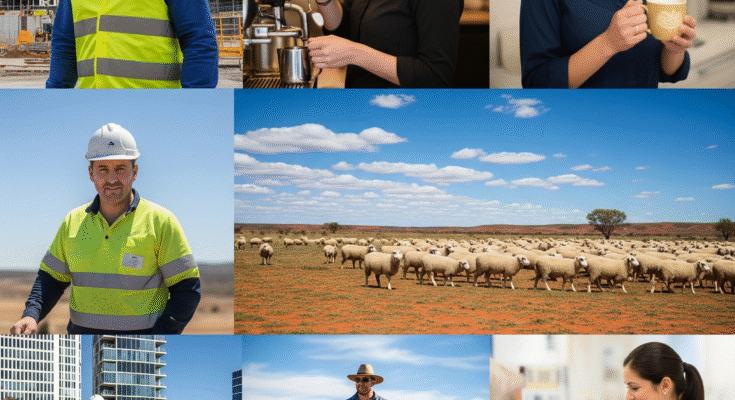A Close Look at Jobs in Australia: Work, Opportunities, and What to Expect
Australia is a place with a lot of space, huge cities, and chances to do things. If you’re a local looking for your next job or an overseas worker seeking for a fresh start, knowing how the Australian job market works might help you a lot. There are different kinds of jobs in Australia, depending on where you live, what kind of work you do, and how much experience you have. Some people get jobs quickly, while others need to plan, wait, and be patient.
This post takes a detailed, real-world look at jobs in Australia. It tells you what’s available, what’s changing, and how to discover the ideal career for you.
1. An Overview of the Job Market in Australia
Australia has one of the most stable economies in the world. The country has had a robust services sector, a low unemployment rate, and a reputation for being hospitable to workers for many years.
Important numbers (as of mid-2025): The unemployment rate is at 4.1%.
Average weekly pay (for full-time work): About AUD 1,300
Healthcare, retail, construction, education, and professional services are the most common fields of work.
The biggest cities for work are Sydney, Melbourne, Brisbane, Perth, and Adelaide.
You can work full-time, part-time, casually, or on a contract basis in Australia. Part-time work are great for students or people who desire flexible hours. Full-time jobs, on the other hand, are more stable and come with perks like paid time off.
2. The Jobs That Are Most Wanted in Australia
Australia’s economy changes, which means that the most in-demand jobs change too. However, several fields have enjoyed stable demand over the past ten years.
A. Health care and help with social issues
This is the biggest job market in Australia. Jobs keep growing because the population is becoming older and healthcare services are getting better.
Roles that are in demand:
Nurses who are registered
Workers who help older people
Workers who help people with disabilities
General practitioners
People who work in mental health
These jobs frequently provide with a lot of job security, particularly in rural and regional areas.
B. Building and Infrastructure
This sector is busy because of big projects all around the country, like roads, railways, and new housing developments.
Roles that are needed:
Engineers of civil engineering
People who work with electricity
People who work with wood
Plumbers
People who manage projects
These positions usually pay well, especially for people who have trade skills and experience.
C. Learning and Training
Teachers are needed in primary, secondary, and vocational schools, especially in rural areas.
Roles that are in demand:
Teachers for maths, science and IT in secondary school
Teachers of young children
Vocational trainers and evaluators
Sometimes, instructors can get paid to move to other parts of the country.
D. Technology for Information
The tech industry in Australia is developing, notably in places like Sydney and Melbourne. It is currently normal to work in a hybrid way.
Jobs that are in high demand:
People who make software
Cybersecurity experts
Analysts of data
People who work with the cloud
Designers of user experience and user interface
Salaries in this field can be considerable, but there are also more people trying to get jobs.
E. Tourism and Hospitality
This part of the economy was hurt by the pandemic, but it has quickly recovered. There is a lot of need for hospitality professionals, especially in seasonal or regional contexts.
Roles that are in demand:
Cooks and chefs
People who work behind the bar
The people who work at the hotel
Guides for tours
A lot of the time, these jobs are done by backpackers and people on working holidays, especially in seaside communities or the outback.
3. Jobs in the city vs. jobs in the region
Australia is a massive country, and there are big disparities between the cities and the countryside. Sydney and Melbourne get the most job applicants, but regional Australia has its own distinct career options.
Cities: More Options and More Competition
The biggest cities (Sydney, Melbourne, and Brisbane) have the most different kinds of employment and industries. But they also cost more to live in and have greater competitors.
Fewer competitors and more local benefits in regional areas
Rural and remote areas require qualified labour and typically provide perks to get them. These can be things like help with moving, housing subsidies, and visa perks for people who move to a new country.
In some places of Australia, the government may give a lot of money to help a registered nurse or electrician move to a small town.
4. How to Get a Job in Australia
The procedure of applying for a job in Australia is usually simple but very competitive, whether you live there or not.
A. Where to Search
The main online job boards are Seek, Indeed, and Jora.
Company websites: Many businesses post job openings directly on their sites.
JobSearch and Workforce Australia are two government websites that list jobs and offer help for people looking for work.
Recruitment agencies: Very helpful for short-term contracts or jobs that require a lot of skill.
B. Tips for your resume
Australian resumes (CVs) should be short, no more than two or three pages. They don’t care about personal information like age or marital status; they care about talents and work history.
Keep these in mind:
Use bullet points and clear headings.
Customise your resume for each job.
Don’t include a picture.
Put down referees or say “available upon request”
C. Cover Letters
A concise, to-the-point cover letter can make a difference. Send it to the person who will be hiring you and show that you know what the job is and what the organisation needs.
D. Interviews
Most of the time, interviews are formal but also friendly. Look over the job ad, think of samples of your past work, and learn more about the company before the interview.
5. How to Work in Australia as a Foreigner
Australia is a popular place for skilled workers, students, and those on working holidays to go. You will need the right visa to work lawfully.
Common Work Visas: Temporary Skill Shortage (TSS) visa (subclass 482): For skilled professionals who are sponsored by their employer
Skilled Independent visa (subclass 189): A permanent visa for certain jobs that is based on points.
Working Holiday visa (subclass 417 or 462): For young persons (typically between the ages of 18 and 30) from countries that are eligible
Student visa (subclass 500): lets you work a little while you study
Visa requirements vary all the time, so it’s a good idea to visit the official Home Affairs website or talk to a migration agent.
6. Your rights as an employee in Australia
The Fair Work Ombudsman makes sure that workers in Australia are well protected.
Basic employee rights include: Minimum wage (AUD 24.10/hour for adults as of July 2024)
Leave rights (sick, yearly, and parental)
Safe places to work
Protection from being fired unfairly
To make up for not getting paid time off, casual workers get paid more each hour.
You can get support from the Fair Work Ombudsman if anything doesn’t feel right.
7. Freelancing and the gig economy
In Australia, freelancing and gig work are becoming more popular. A lot of people now make money via apps like Uber, Airtasker, Upwork, or Deliveroo.
Pros: You can work when you want.
A fast way to make money
No long-term obligation
Cons: No paid time off or job security
Employees frequently finance their own superannuation and insurance.
It can be hard to predict
If you freelance a lot, you might want to set up as a sole trader and receive an Australian Business Number (ABN).
8. Changes in the job market in 2025
Technology, climate change, and changes in the population are all changing the job market in Australia.
A. Jobs in Green Are Growing
Jobs in renewable energy, environmental research, and building that lasts are growing. The solar and wind power businesses are hiring engineers, technicians, and project managers.
B. Remote work is here to stay.
A lot of organisations, notably in software, marketing, and consulting, provide hybrid or entirely remote jobs. This makes things easier for people who don’t live in big cities.
C. Learning New Skills Is Important
People are more interested in short courses, micro-credentials, and online learning platforms. Employers like people who are always learning.
You don’t need a full degree to learn new skills on websites like LinkedIn Learning, Coursera, and TAFE.
9. Advice for People Looking for Work
If you’re just starting off or want to change careers, here are some useful tips:
For those in Australia: Keep your resume up to date
Use LinkedIn; recruiters use it a lot.
When jobs are posted, apply right away.
Think about taking on contract work to get your foot in the door.
For Migrants: Look into which jobs are on the list of skilled occupations.
If you need to, work on your English skills.
Get your qualifications from other countries accepted (verify with the Australian Government Qualification Recognition).
Get local experience by volunteering or doing internships.
10. Stories about yourself
Raj from India: Raj moved to Australia in 2020 to study IT for his Master’s degree. He is now a software engineer. He began working part-time as a barista and then got a junior job with a local software company once he graduated. He now works full-time as a front-end developer in Melbourne.
His advise was, “Even if you don’t have local experience, show that you want to learn.” Networking is helpful. “Meetups, LinkedIn, and connections from school are very important.”
Emily from Queensland: A Job Change at 40
Emily worked in hospitality for 15 years before going back to school to become a disability support worker. She works for a community care provider today and says the job is both hard and gratifying.
Her advice: “You can always change. I took a TAFE course, did a placement, and got a job in less than two months. “Everywhere there is a big need for carers.”
Last Thoughts: There are a lot of employment in Australia in many various fields and areas. There is probably a job out there for you, whether you want to work in a trade, a corporation, or something more hands-on.
It could take some time to find a job, especially if you’re new to the nation or if you’re looking for work in a field where there are a lot of people looking for work. But if you prepare well and keep looking, you can find a job that works with your skills and lifestyle.
Keep your expectations modest, be willing to change, and be open to learning. In Australia, jobs aren’t only about making money; they’re also about making a difference, making connections, and establishing a future in a country that is known for giving people a fair chance.



